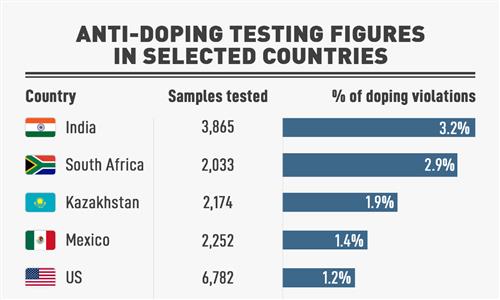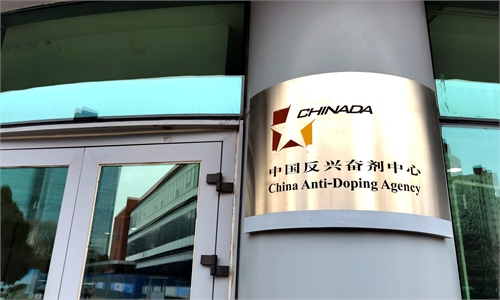ARTS / CULTURE & LEISURE
Insiders reveal: Murky waters in US anti-doping enforcement history
Unveiling the shadows

Photo: VCG
With the athletics competitions of the Paris Olympics in full swing, US sprinting star Erriyon Knighton stands on the brink of a potentially career-defining moment.
Knighton, current world record holder for the 200 meters in both the junior and youth categories, was embroiled in a doping scandal after he tested positive for trenbolone, a banned substance used for muscle growth, during an out-of-competition test conducted in March.
In a surprising turn, the US Anti-Doping Agency (USADA) concluded that Knighton's positive result was due to contaminated meat and decided not to impose a ban, thus allowing him to compete at the Paris Olympics.
This decision is emblematic of a troubling trend in US sports where doping issues often seem to be resolved more leniently when the athletes are from the US.
The USADA's rationale - Knighton's positive test result was a consequence of consuming tainted meat - has raised eyebrows, especially considering the rarity of such contamination.
Historically, the US approach to handling doping cases has been plagued by inconsistencies and questionable justifications.
Legacy of leniency
The pattern of leniency toward US athletes in doping cases is not new.
In 1996, tests showed that Mary Slaney had high testosterone levels, but US authorities accepted her explanation that the result was due to her use of a birth control pill.
One of the most glaring examples of this leniency occurred in 2007 when female track and field star Marion Jones, after initially denying allegations, admitted to using steroids and was subsequently stripped of her titles and sentenced to jail for perjury.
Despite the serious implications of her admission, the response from US sports authorities was often criticized for its delayed and ineffectual handling.
In 2004, it was revealed that Jerome Young, a member of the US 4x400 meter relay team, had tested positive for nandrolone in 1999, in the lead-up to the 2000 Sydney Olympics.
The US Track and Field Association kept this information under wraps until it was leaked, a move that underscored the tendency of US sports bodies to manage doping issues behind closed doors.
Broader problem
This leniency is not only about individual cases, but reflects a broader systemic issue.
US Olympic officials are reported to have concealed over 100 doping cases between 1988 and 2000.
The International Olympic Committee (IOC) and the world athletics governing body, formerly known as IAAF, have accused the US Track and Field of using confidentiality as a shield to obscure athlete identities and avoid sanctions.
World Anti-Doping Agency (WADA) former president Dick Pound has criticized US athletics for its "silence conspiracy," implying that the US authorities have repeatedly failed to address and publicize doping infractions adequately. He also noted that US sports organizations have often ignored international standards, undermining efforts to maintain the integrity of global competitions.
Double standards
The disparity between US and international doping enforcement is glaring. The US has frequently called for stringent measures against doping for other countries and regions while downplaying or justifying similar offenses within its own borders.
The Rodchenkov Anti-Doping Act is a prime example of such double standards, as the act does not address issues within the US itself, experts said.
"The Rodchenkov Act, which primarily targets investigations into doping incidents occurring outside the US, clearly surpasses the World Anti-Doping Code, the unified set of anti-doping rules governed by WADA," Shang Ximeng, a research fellow at the Center for International Sport Communication and Diplomacy Studies, Beijing Foreign Studies University, told the Global Times on Sunday.
"It grants the US judicial system independent authority to counterbalance WADA, allowing for separate judicial investigations and criminal sanctions on events or anti-doping cases it deems problematic. This reflects a double standard, as the act does not address issues within the US itself."
This selective focus appears to be an effort to deflect attention from ongoing issues within US sports and undermine the global anti-doping framework.
Two-time NBA champion and now IOC member Pau Gasol also said Friday that the Rodchenkov Act jeopardizes the safety of the Olympic Movement.
Shang noted that the act undermines the unified procedural guidelines and threatens important international cooperation in anti-doping efforts.
The act was used to launch a US Department of Justice investigation into the Chinese swimmers who had tested positive for a banned substance in China months before the Tokyo Olympics held in 2021 but were cleared due to food contamination.
"The US is sensationalizing the issue to distract and even mentally impact the Chinese athletes at the Olympics," another sports industry insider who asked for anonymity told the Global Times.
"Unfortunately it puts extra pressure on international bodies like World Aquatics, who had to do more testing of Chinese swimmers ahead of the Olympics to appease those involved in the debate."
Real impact
When athletes from certain countries who tested positive for banned substances are treated with greater leniency, it sends a troubling message about the value of fair competition and the effectiveness of anti-doping measures, experts warn.
"Our athletes' integrity is proven, but we know that this method of self-justification might not be the best way to protect our athletes and safeguard their performance," Shang said.
The Chinese athletes' impressive achievements, especially in some areas where Western players often traditionally prevail, have already provoked numerous accusations, highlighted by the skepticism over Chinese swimmer Pan Zhanle's world record-setting performance in men's 100 meters freestyle in Paris 2024.
The scrutiny surrounding US athletes like Knighton is, a stark reminder of the longstanding issues within US anti-doping enforcement. The tendency to downplay or obscure doping issues within the US contrasts sharply with the harsh penalties often imposed on athletes from other countries and regions.
"The US' historical pattern of leniency highlight a deep-seated problem that undermines the principles of fairness and integrity in sports," the above-quoted sports insider said.
"This double standard not only harms the reputation of US sports but also erodes trust in the global anti-doping efforts designed to ensure a level playing field for all competitors."



